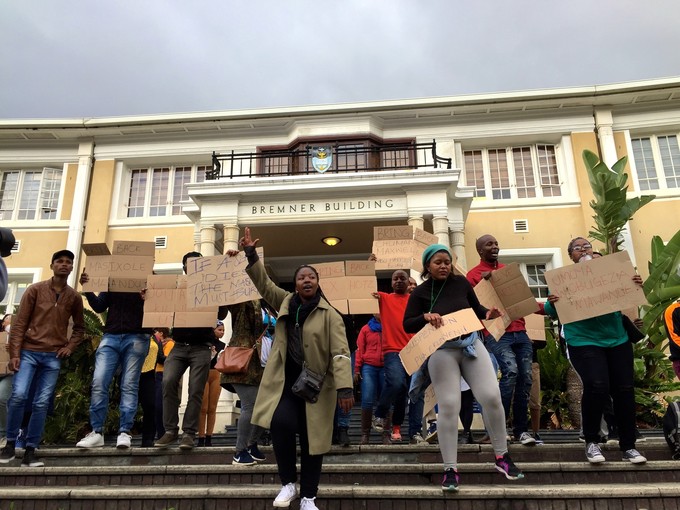
A rally held in June outside UCT’s administration building demanded charges against students be dropped. Photo: Naib Mian
7 November 2016
Last night an agreement was reached between the management of the University of Cape Town and the student protest groups Shackville TRC and SRC Candidates. The agreement offers clemency to students suspended following the February protests and establishes a commission to investigate past student protests and recommend improvements to the university.
According to the agreement, to gain clemency, suspended students must sign a declaration acknowledging wrongdoing and committing not to repeat similar actions in the future. Clemency can also be revoked if there are further disruptions of exams and academic activities.
The document does not specify the meaning of clemency, however, only stating that signing the declaration “will provide clemency for specific offenses which relate to the protests around February 2016”. In one of these protests, UCT art was burnt, cars were set alight and vice-chancellor Max Price’s office was burnt. A Supreme Court of Appeal decision upheld an interdict against students who were involved in this protest.
The agreement also outlines the responsibilities of a new Institutional Reconciliation and Transformation Commission (IRTC), otherwise known as the Shackville TRC. It will look into the “Shackville protests” of February 2016, as well as related and subsequent protests and, in the case of suspended students, “make recommendations on the granting of amnesties (or the continuation of clemency) and what the nature of these amnesties will be”.
Since the IRTC will be responsible for further investigation of student protests, the agreement places a moratorium on disciplinary tribunals related to the cases of student protesters, pending the recommendations of the IRTC.
The IRTC will also make recommendations to UCT on “institutional culture, transformation, decolonisation, discrimination, identity, disability” and other matters, according to the agreement.
The agreement also commits the university “to examine the possibility and implications of fee-free higher education”, including a research program into economic policy around fee-free higher education and a dedicated unit at the university to engage in debates and lobby at the national level for more higher education funding.
Furthermore, the university will put in place “programs, activities and timeframes on how the concept of decolonisation can be approached by the university community as a whole”.
On the subject of financial difficulty for undergraduate students, the agreement includes a commitment by the executive that students in good academic standing who are on track to graduate but are being prevented due to affordability will be allowed to graduate or progress.
In addition, the agreement commits the university to seeking donor funds to cover fees of those whose studies the National Student Financial Aid Scheme (NSFAS) cannot cover, and to release degrees to students who have had degrees withheld due to an inability to pay debts to the university.
Students may also choose to take their exams in January rather than November, according to the agreement. The university commits to make residences, food and transport available so that students deferring their exams will not be “in an adverse financial position”.
A committee appointed by the university is developing a protocol for the use of private security to be drafted by year end. The agreement states that “if an agreement is reached on these principles which leads to a de-escalation of conflict, the executive is open to removing private security as soon as possible”.
Finally, the agreement establishes a Rapid Response Task Team, made up of representatives from the executive task team and representatives from student groups, to monitor the implementation of the agreement.
Exams started on UCT this morning. When GroundUp visited upper campus, no private security was visible and only one police car was patrolling. Exams appeared to be underway without incident.